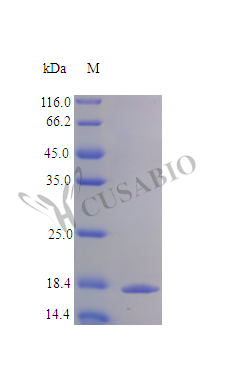Recombinant Human Interleukin-19 protein (IL19) is produced in E. coli, covering the expression region 25-177aa. This tag-free protein shows purity exceeding 95%, as verified by SDS-PAGE analysis. Endotoxin levels remain below 1.0 EU/μg as determined by the LAL method. The protein maintains full biological activity, with an ED50 of less than 1.5 ng/ml, determined through a cell proliferation assay—suggesting robust activity.
Interleukin-19 (IL19) belongs to the IL-10 cytokine family and appears to play a key role in immune response modulation. It works by binding to receptor complexes that include IL-20Rα and IL-20Rβ, which may influence the signaling pathways that regulate inflammatory responses. This positions IL19 as a significant protein for research aimed at understanding cytokine-mediated communication within the immune system.
Potential Applications
Note: The applications listed below are based on what we know about this protein's biological functions, published research, and experience from experts in the field. However, we haven't fully tested all of these applications ourselves yet. We'd recommend running some preliminary tests first to make sure they work for your specific research goals.
1. IL-20 Receptor Signaling Pathway Studies
This recombinant IL-19 protein is confirmed to be biologically active through IL-20Rα and IL-20Rβ receptors (ED₅₀ < 1.5 ng/ml) and is suitable for studying IL-20 receptor signaling pathways. The defined activity ensures reliable investigation of STAT phosphorylation and gene expression changes in receptor-expressing cells. However, since the protein is expressed in E. coli and lacks mammalian post-translational modifications, signaling kinetics may differ slightly from native human IL-19 in some cellular contexts.
2. Cell Proliferation and Viability Assays
The validated biological activity in BaF3 cell proliferation assays makes this protein appropriate for studying IL-19's effects on IL-20 receptor-expressing cells. The high specific activity (>6.7×10⁵ IU/mg) ensures consistent results in proliferation assays. When testing new cell types, researchers should first confirm IL-20 receptor expression and validate responsiveness, as activity may vary across different cellular backgrounds.
3. Antibody Development and Validation
This tag-free, high-purity IL-19 protein serves as an excellent antigen for antibody development and characterization. The preserved biological activity enables functional antibody screening for neutralizing antibodies. However, since the protein is produced in E. coli and represents a partial sequence (25-177aa), the resulting antibodies should be validated against full-length, mammalian-expressed IL-19 to ensure recognition of native protein conformations.
4. Protein-Protein Interaction Studies
The biologically active IL-19 protein is suitable for binding studies with IL-20 receptor subunits. The low endotoxin level minimizes non-specific interactions. For interactions beyond known receptors, researchers should note that the E. coli expression system lacks mammalian glycosylation patterns, which might affect some protein-protein interactions. Critical findings should be confirmed with mammalian-expressed IL-19 when possible.
5. Cytokine Network Analysis
This recombinant IL-19 can be used to study its role within cytokine networks, particularly in IL-20 subfamily interactions. The defined biological activity allows precise dosing in multiplex assays. However, as the protein is a partial fragment expressed in E. coli, its behavior in complex cytokine networks may not fully recapitulate native IL-19 function in all physiological contexts. Results from co-culture experiments should be interpreted with this limitation in mind.
Final Recommendation & Action Plan
This E. coli-expressed Human IL-19 protein is a validated research tool suitable for the proposed applications, with its biological activity confirmed through specific receptor-mediated proliferation assays. For immediate use, employ it in IL-20 receptor signaling studies and proliferation assays using appropriate receptor-expressing cells. When developing antibodies, utilize both this protein for immunization and mammalian-expressed IL-19 for validation to ensure recognition of native conformations. For interaction studies, the protein is reliable for IL-20 receptor binding characterization, but findings regarding novel binding partners should be confirmed with mammalian-expressed protein. While the partial sequence and prokaryotic expression may limit direct extrapolation to all human physiological contexts, the demonstrated high specific activity and low endotoxin levels make it a valuable reagent for most in vitro applications. Always include proper controls and dose-response validation in experiments to ensure data quality and reproducibility.






